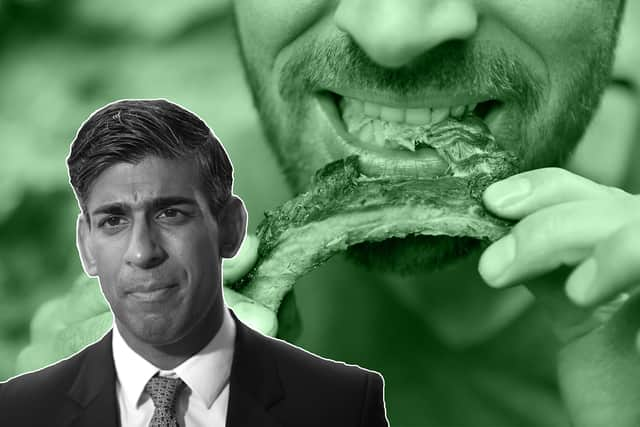Fact check: are Rishi Sunak's claims about 'heavy-handed' green policies like the 'meat tax' correct?
and live on Freeview channel 276
Rishi Sunak has been accused of pretending to halt "frightening" climate change measures that are not actual proposed policies - including mandatory car sharing and a so-called "meat tax".
In a speech on Wednesday afternoon, the Prime Minister announced a ban on new petrol and diesel vehicles - originally set for 2030 - would be pushed back five years, amid a raft of other policy changes considered by many pundits as a row-back on net zero policies.
Advertisement
Hide AdAdvertisement
Hide AdIn a post on X - formerly known as Twitter - Sunak posted a series of claims about environmental measures that many Britons responded to with incredulity - with some questioning whether they were exaggerated, strawman arguments rather than being rooted in real policy.
"We will never impose unnecessary and heavy-handed measures on you, the British people," Sunak wrote in the post. "We will still meet our international commitments and hit Net Zero by 2050."
Among the "heavy-handed measures" Sunak said he had scrapped were a tax on eating meat, new taxes to discourage flying, households sorting rubbish into seven different bins, compulsory car sharing, and expensive insulation upgrades.
But were these actual policies? Here's everything you need to know:
Advertisement
Hide AdAdvertisement
Hide Ad

A tax on eating meat
There is currently no existing net zero policy that taxes people for eating meat in the UK, nor was there a specific meat tax proposal making its way through parliament.
Sunak was queried on the meat tax claim on BBC's Today programme, where he cited it as a proposal made by the Climate Change Committee - an independent public body which advises the UK on tackling and preparing for climate change, but cannot impose laws itself.
The chief executive of the committee, Chris Stark, told Today they had never recommended a so-called “meat tax”. He described Sunak's comments as “straw men suggestions”, and added: “He seemed to be cancelling a set of policies that the government hadn’t announced, which is, I suppose, a political technique.”
Paul Waugh, chief political commentator at the i, posted on X that the committee had in fact urged "low-cost, low-regret actions to encourage a 20% shift away from all meat by 2030", but had said nothing on a meat tax.
Advertisement
Hide AdAdvertisement
Hide AdNew taxes to discourage flying
This appears to be in a similar vein to the so-called "meat tax", an expert suggestion that was not being seriously proposed by politicians.
Chris Stark, of the Climate Change Committee, listed this alongside the meat tax as a “peculiarity”, which had never been government policy.
He added that it was "important to say these might be in the policy mix but they’re just suggestions" and they might be needed only if it looks like mainstream policies that would guide emissions down "weren’t working".
Sunak has denied that he was pretending to halt things that were not actual policies, saying: "these are all things that have been raised by very credible people about ways to meet our net zero obligation."
Advertisement
Hide AdAdvertisement
Hide AdSorting rubbish into seven different bins
This appears to be linked to an announcement by Defra - the Department for Environment, Food & Rural Affairs - sent out shortly after Sunak's conference ended.
This announced a new Simpler Recycling scheme, which would remove the current "top-down" approach to recycling, in favour of a more simplified approach.
However, in official guidance sent out after Wednesday's announcement - shared by political commentator Paul Waugh - Defra admitted that "it was never the case that seven bins would be needed by households".
But it said the new policy would help ensure it.
The BBC reports in 2021, Sunak actually voted in favour of the Environment Act, a law which local authorities say meant that households in England would eventually have to split their own rubbish and recycling - while also expanding the range of materials which could be recycled.
Advertisement
Hide AdAdvertisement
Hide AdPA reports the government had planned to unveil a new strategy in March that may have required households to separate more types of waste into different containers, but the plans were delayed until after local elections amid concern over a backlash from voters.
'Compulsory' car sharing
Like the meat and flight taxes, this appears to stem from another Climate Change Committee suggestion - which was again, just a suggestion to lawmakers.
Sunak told BBC's Nick Robinson the Committee mentioned "ride-sharing solutions" in their report.
On compulsory car sharing, Sunak said: “What [the report] then says euphemistically is one would need to consider demand-side measures to bring that about, which are otherwise known as compulsion or taxes.”
Advertisement
Hide AdAdvertisement
Hide AdExpensive insulation upgrades
This was an actual policy included in the raft of announcements Sunak made on Wednesday afternoon.
Downing Street officials told the Evening Standard proposals which would require landlords to make homes more energy efficient by 2035 - by taking measures like fitting heat pumps, insulation, or solar panels - would not be taken forward.
However, the paper reports this has led to criticism that while landlords might save money, the cost of heating poorly-insulated properties in the colder months would be passed down to their renters.
NationalWorld has approached the Prime Minister's spokespeople for additional clarification on his points.
Comment Guidelines
National World encourages reader discussion on our stories. User feedback, insights and back-and-forth exchanges add a rich layer of context to reporting. Please review our Community Guidelines before commenting.
